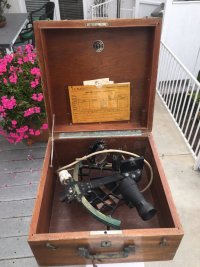Lew Decker
Member III



Whoops. I remember that I paid $340 for my Tamaya, and that included the 7X scope. I just punched up the current offerings. All I can say is, "Dang!"
Since celestial navigation via sextant has been reduced to hobby status, you could use any type that falls into a decent price range. People have circumnavigated with the Davis instruments, so...
I also know of at least one cruising boat that made it out to Hawaii by following jet contrails. Hmmm. Maybe that's an old sailing myth?
I actually sailed to Tortola from St. Pete on a delivery and took exactly one star sight. True story. There were a lot of contrails.




